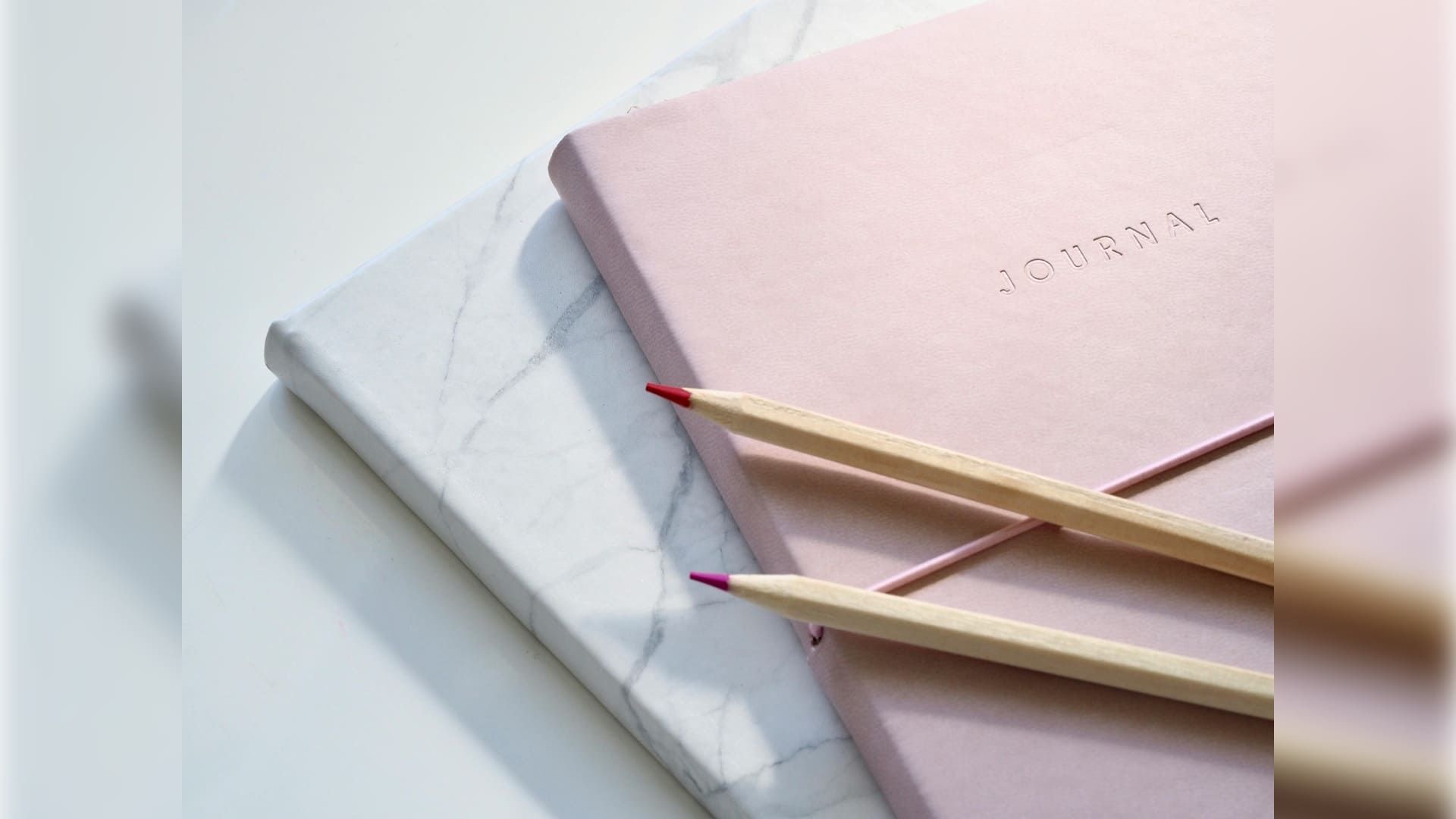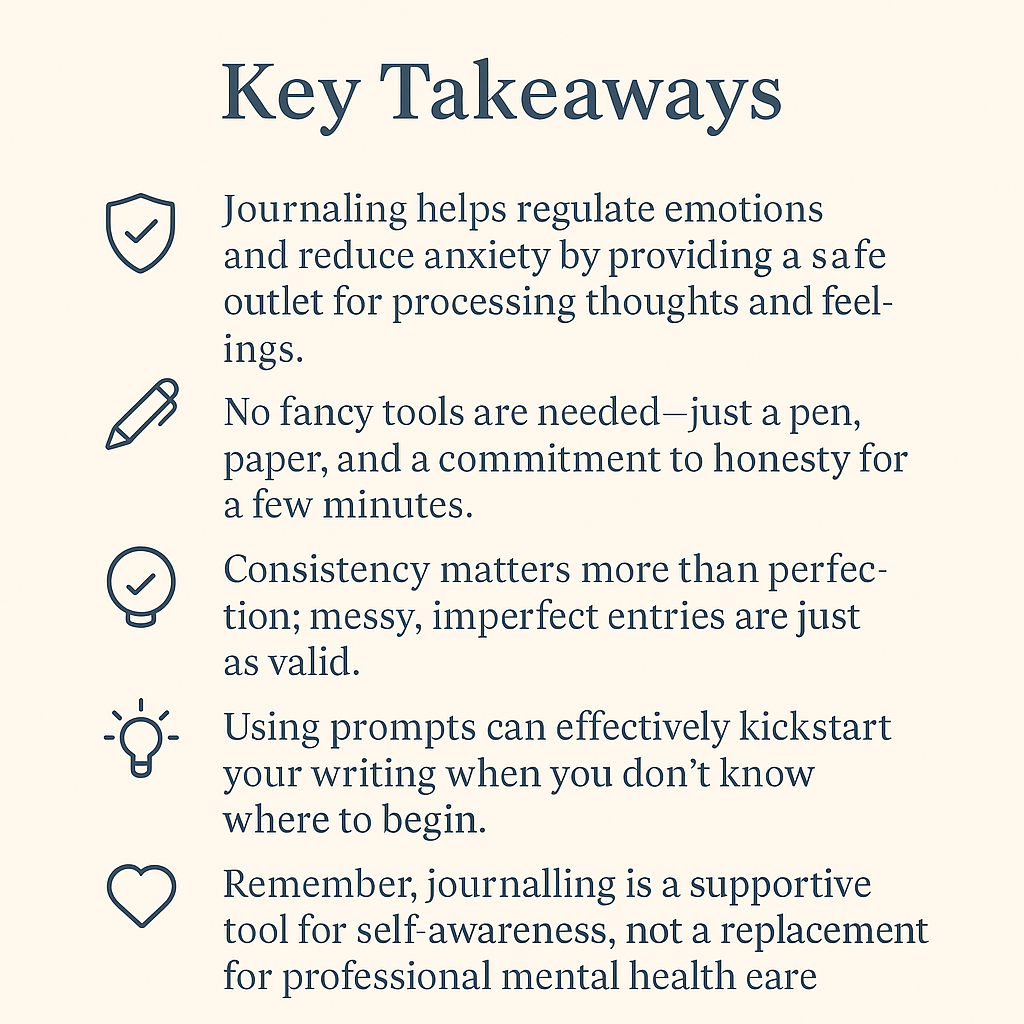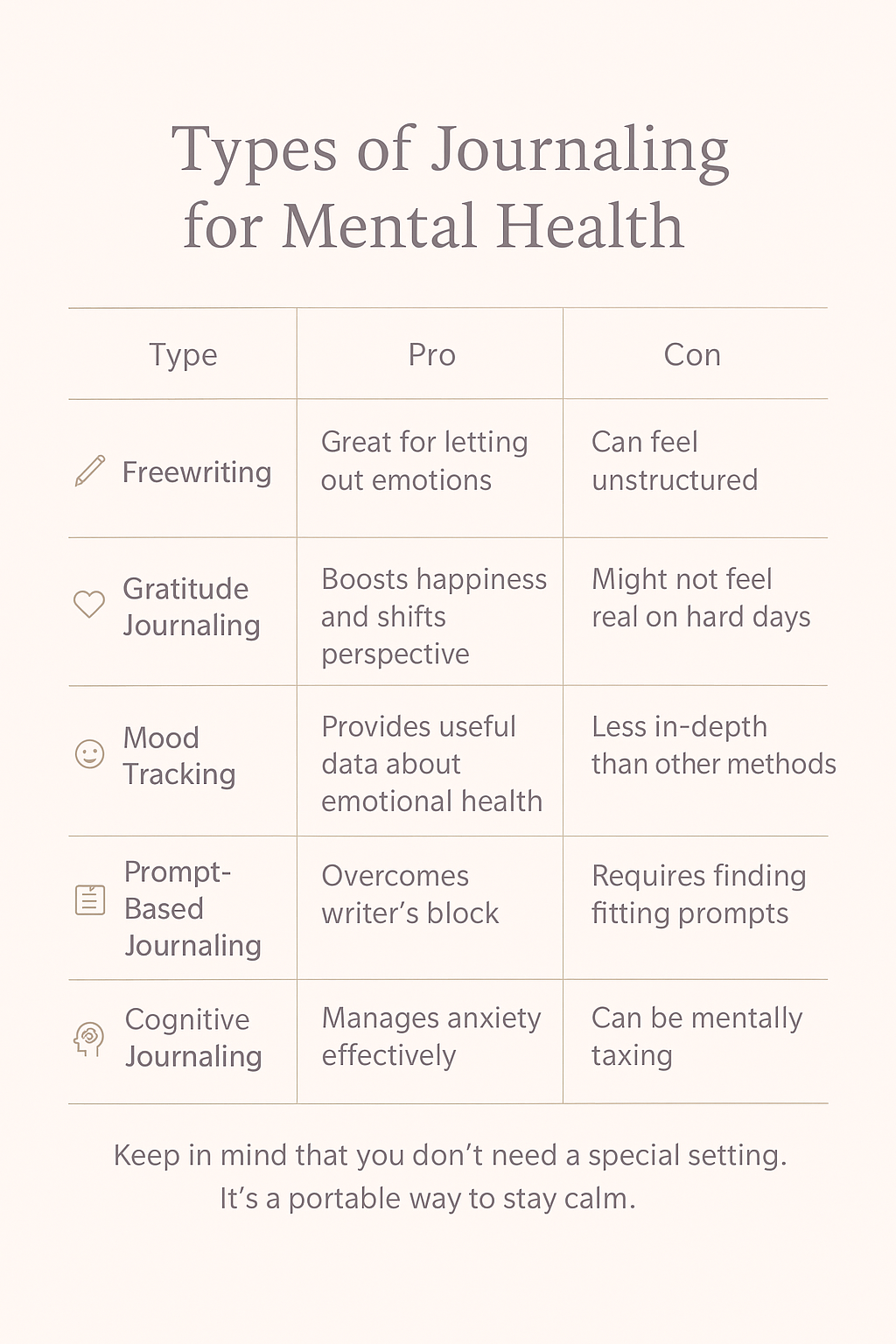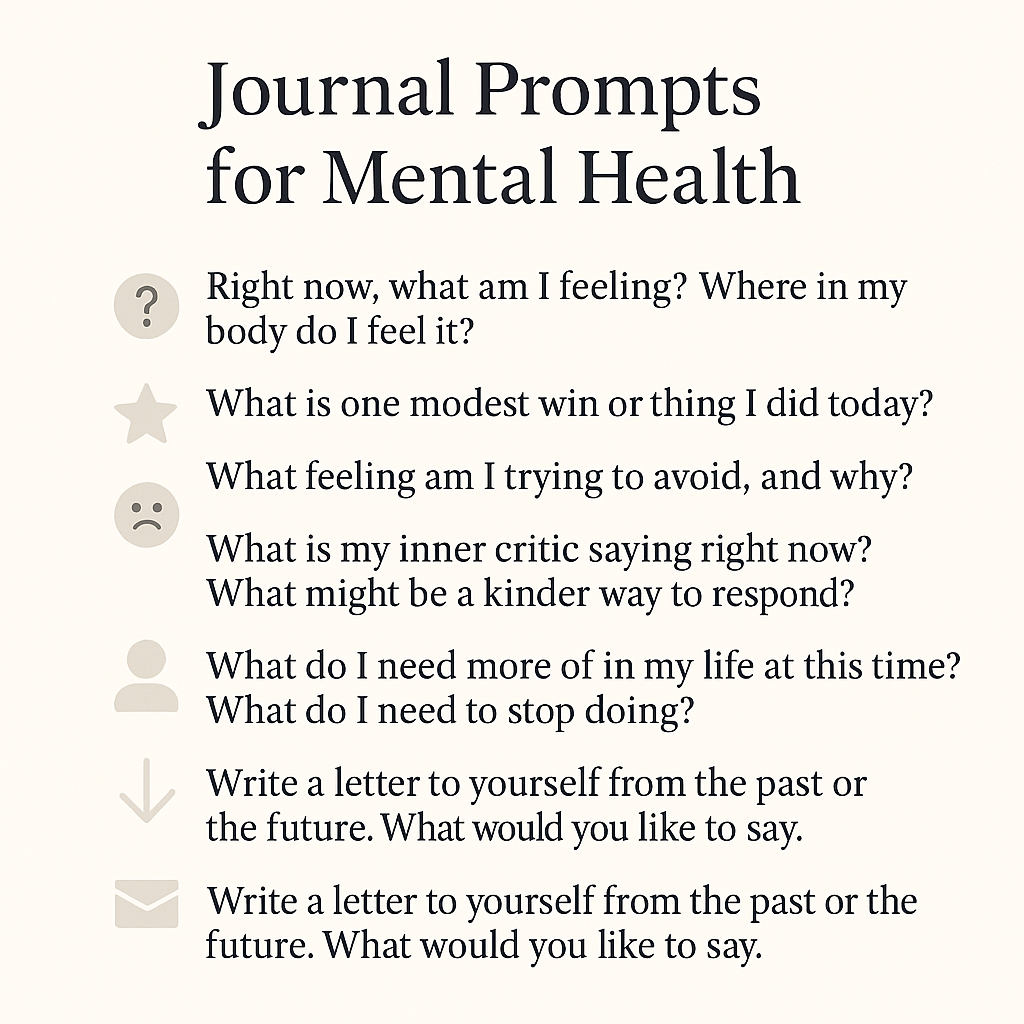Journaling for Mental Health: Simple Daily Practices to Reduce Anxiety and Stress

Sarah Johnson, MD

A lot of people now feel stressed, nervous, or mentally tired. In the cacophony of everyday life, our feelings frequently get pushed down, making us feel disconnected and frustrated without a clear means to deal with it all. Journaling for mental health is a simple, easy, and science-based way to go back to yourself. It's a great way to reconnect with your feelings, lower your stress, and get the insight you need.
- What Is Journaling for Mental Health?
- Why Journaling Helps: The Science Behind It
- Different Types of Journaling for Mental Health
- Common Roadblocks & How to Overcome Them
- Getting Started: Tools, Time, and Setting
- Journal Prompts for Mental Health
- How to Make Journaling a Lasting Habit
- Reflecting on What You Write
- When Journaling Isn’t Enough: Seek Extra Support
- Final Thoughts & Encouragement
- FAQs
This guide will show you the benefits of journaling for mental health, provide easy ways to get started, give you ideas for when you're stuck, and offer recommendations on how to make it a regular part of your self-care routine.
Journaling creates a safe space to untangle complex feelings and reduce stress. When you need further guidance, turning to a mental health AI can offer helpful prompts and insights.

What Is Journaling for Mental Health?
Journaling isn’t just a creative outlet — it’s a proven stress-management tool. Studies on the benefits of journaling show that regular writing helps process emotions, improve focus, and enhance mental clarity. Even short daily reflections can build emotional resilience over time.
Keeping a diary of your everyday activities is not the only way to practice journaling for mental health. It's a deliberate way to use writing to look inside your own mind. There are numerous ways to do this, such as emotional journaling (putting your feelings on paper), reflective writing (thinking about events and how they affected you), or thankfulness journaling (focused on the good things in life).
The main goal of journaling for mental health is to make a quiet, non-judgmental space where you may sort through your complicated ideas, learn about your emotional patterns, and build a better relationship with yourself. This form of writing isn't about getting people to read it; it's about hearing yourself, which is the core of effective journaling for mental health.

Why Journaling Helps: The Science Behind It
There is research to back up the claims that journaling for mental health is good for you. Dr. James Pennebaker and others have proven that writing expressively for 15 to 20 minutes a day for several days will greatly alleviate anxiety, increase mood, and lower stress levels.
How does it function? The act of writing, central to journaling for mental health, uses the prefrontal cortex, which is the part of the brain that controls logic and reason. Putting your jumbled, overpowering feelings into words and sentences makes your brain organize and make sense of them. This gives you a very important cognitive distance, which lets you see your feelings instead of letting them take over your mind.
This procedure can have real medical benefits, such as better sleep, reduced blood pressure, and even a stronger immune system when the stress on your body goes down. The science confirms that the practice of journaling for mental health is a powerful tool for overall well-being.
Different Types of Journaling for Mental Health
There isn't just one "right" way to practice journaling for mental health. Trying things out can help you figure out what works best for you:

Finding the right style is key to a sustainable journaling for mental health practice.
Common Roadblocks & How to Overcome Them
- "I don't know what to say." You can use questions (see below) or just start by talking about your day or how you feel physically.
- Afraid of being judged. - Keep in mind that this is only for you. You can even tear up the pages afterward to show how private it is.
- Perfectionism. - Accept the mess. Get a cheap notebook and let yourself write badly. The method is more important than the product.
- "I'm too busy." - Begin with tiny things. Three minutes is still a lot of time. To help it stick, connect it to something you already do, like your daily coffee.
When you write kindly to yourself, your inner dialogue begins to change. Many people discover that combining journaling and positive self-talk helps them replace harsh self-criticism with encouragement and compassion — one entry at a time.
Getting Started: Tools, Time, and Setting
You don't need anything extra to get started. A pen and notebook are all you need. If you want digital, a notes app or a journaling software made particularly for it (like Day One or Journey) will work just as well. The most important thing is ease. Find a time that works for you, like first thing in the morning to make goals or at night to relax. Make a low-pressure habit: select a comfortable spot, brew a cup of tea, and start with just five minutes. You don't want it to seem like a chore; you want it to feel like a gift.
Journal Prompts for Mental Health
When you can't think of anything, prompts can help. To get started, try these:

How to Make Journaling a Lasting Habit
When you make journaling a part of your daily life, it's easier to stick to your habits.
- Habit Stacking: Link your journaling to something you already do every day, like brushing your teeth or taking a break for lunch.
- Set Realistic Goals: You don't have to write a book every day. It could be three sentences on some days. That's enough.
- Make visual reminders: Put your notepad and pen on your nightstand or set a gentle reminder on your phone.
- Celebrate Small Wins: Recognize how consistent you are. After a week of entries, give yourself a pat on the back for showing up.
- Gentle Accountability: Tell a friend who will support you that you want to keep a journal. You don't have to divulge what you write, just your aim.
Reflecting on What You Write
Journaling for mental health isn't just about putting words on paper; it's also about learning from what you've written. Take a few minutes every few weeks to read over your past entries from your journaling for mental health practice. Find patterns: Do some circumstances always make you anxious?
Are there negative thoughts that keep coming back that you can fight? You might also be astonished by your own growth and resilience. These insights are a key benefit of journaling for mental health—you can bring them to therapy or use them to make more conscious decisions in your daily life.
If journaling brings up strong emotions, pair it with grounding techniques to stay present. The 5-4-3-2-1 grounding method can help you reconnect to your body and surroundings before or after writing, reducing emotional overwhelm.
When Journaling Isn’t Enough: Seek Extra Support
Keep in mind that journaling for mental health is a tool for self-care and awareness, not a replacement for professional mental health care. If your practice of journaling for mental health consistently brings up intense distress, trauma, or suicidal thoughts, it is a sign to seek extra support. If writing sometimes heightens your anxiety, focusing on body-based calm can make journaling easier.
Learning how the vagus nerve affects anxiety may help you use breathing, humming, or gentle movement to activate your body’s natural relaxation response before you write. There is no shame in reaching out to a therapist or counselor. In fact, journaling for mental health can be a wonderful complement to therapy, helping you process sessions and track your progress.
Final Thoughts & Encouragement
You don't have to be a "writer" to get something out of journaling for mental health. Anyone with a mind full of thoughts and a heart full of feelings can benefit from this practice. Every page you write, no matter how small or sloppy, is a step toward greater self-understanding and peace through journaling for mental health. Your journal is a sacred, private space for healing and clarity. So why not begin your journey of journaling for mental health today? Take a deep breath, pick up a pen, and write just one sentence. You can do this.
FAQs
What is the best time of day to journal for mental health?
There isn't one best time. Writing in the morning can help you set goals for the day, and writing in the evening can help you deal with and let go of what happened throughout the day. Try different times to observe when you feel most reflective or need to let go of your feelings.
What if I don’t know what to write?
This happens a lot. Begin with a basic question, such as "What's on my mind?" may simply keep writing, "I don't know what to write." A lot of the time, just moving your pen will help you think.
Is digital journaling as effective as handwritten journaling?
Yes, the expression is what makes it work, not the medium. Some studies say that writing by hand may help you remember things and slow you down, but many people find that digital journaling is easier to keep up with. Pick something that you think will be easy for you to keep up with.
How often should I journal?
There are no hard and fast regulations. Writing in a journal two or three times a week can be quite helpful. The idea is to be there, not to be perfect. It's better to write in a notebook for a little time a few times a week than to force yourself to do it every day and stress yourself out.
Can journaling make anxiety worse?
For most people, it helps them feel better, but if free writing makes you think too much or spiral, try something else. Instead, try using concentrated suggestions, making lists of things you're thankful for, or keeping track of your mood. If writing in a journal makes you feel worse all the time, you should stop and talk to a mental health expert.














